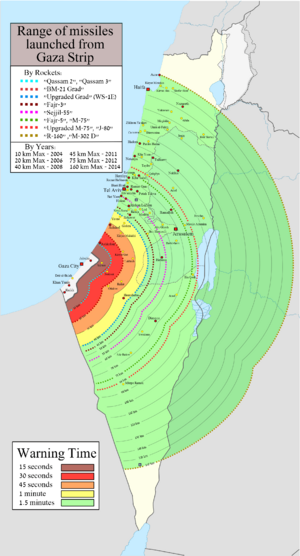Palestinian rocket attacks on Israel facts for kids
Since 2001, groups in the Gaza Strip have launched thousands of rockets and mortar shells towards Israel. These attacks are part of the ongoing Israeli–Palestinian conflict. Many international groups, like the United Nations and the European Union, have said these attacks are wrong because they often target regular people. Human rights groups also say these attacks are war crimes. International law says it's illegal to attack places where only civilians live.
Some groups say they launch rockets because of Israel's blockade of Gaza. However, the Palestinian Authority has said these attacks hurt efforts to find peace. From 2004 to 2014, these attacks sadly killed 27 Israeli civilians and 5 foreign nationals. They also injured over 1,900 people. Studies in Sderot, an Israeli city close to Gaza, showed that almost half of the young children there had post-traumatic stress disorder. They also had high rates of depression.
Many people in Palestine do not support firing rockets at Israel. A poll in March 2013 found that only 38% of Palestinians were in favor of using rockets. But another poll in September 2014 showed that 80% supported rocket fire if Gaza did not have open access. These rocket attacks have even caused flights to be canceled at Ben Gurion Airport.
Contents
What Are These Rockets?
The weapons are often called Qassams. At first, they were simple and could not travel very far. They mostly hit Sderot and other nearby towns. By 2006, more advanced rockets were used, reaching the larger city of Ashkelon.
Later, cities like Ashdod and Beersheba were hit by Katyusha, WS-1B, and Grad rockets. In 2012, Jerusalem and Tel Aviv were targeted. These attacks used locally made "M-75" and Iranian Fajr-5 rockets. In July 2014, the northern city of Haifa was hit for the first time.
Some of these shells have contained white phosphorus. According to one group, these shells are made from old, unexploded bombs.
Who Launches the Rockets?
Different Palestinian groups have carried out these attacks. Before the 2008–2009 Gaza War, most Palestinians supported these actions. However, the reasons given for the attacks have varied.
How Israel Defends Itself
Israel has built special defenses against these rockets. Schools and bus stops have strong shelters. There is also an alarm system called Red Color that warns people about incoming rockets.
Iron Dome is a system designed to stop short-range rockets. Israel developed it and first used it in 2011. It helps protect cities like Beersheba and Ashkelon. Experts warned that it would not stop every rocket, but it has successfully intercepted many.
A Cycle of Events
Rocket attacks and Israeli military actions often happen one after another. Since September 2000, thousands of rockets and mortar shells have been fired at Israel. In response, Israel has carried out several military operations in the Gaza Strip. Some of these include Operation Rainbow (2004), Operation Summer Rains (2006), Operation Cast Lead (2009), Operation Pillar of Defense (2012), and Operation Protective Edge (2014). More recently, there was Operation Guardian of the Walls (2021) and Operation Swords of Iron (2023).
Rocket and Mortar Attacks: A Summary
It is hard to count the exact number of rockets fired. Different groups have given different numbers. The numbers for injuries and attacks often come from the Israeli Ministry of Foreign Affairs. Before September 2005, most attacks were aimed at Israeli targets inside the Gaza Strip itself.
From 2001 to mid-2015, over 18,900 rockets and mortar shells were fired. These attacks caused 33 deaths and injured over 1,970 people. The number of attacks has changed a lot over the years. For example, there was a big increase in attacks in 2007 and 2008. After a period of fewer attacks, there was a very large increase in 2014.
See also
- Israeli–Palestinian conflict
- Israeli casualties of war
- List of Palestinian rocket attacks on Israel
 | Aaron Henry |
 | T. R. M. Howard |
 | Jesse Jackson |


